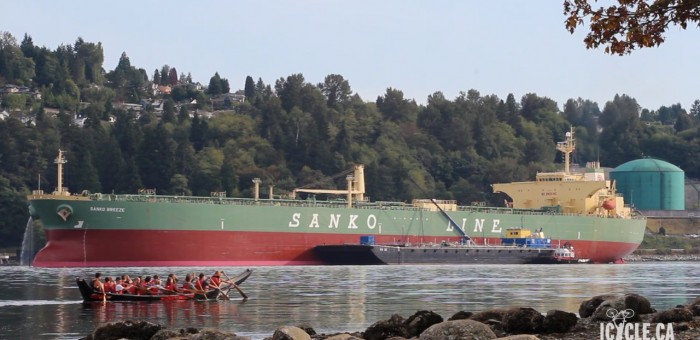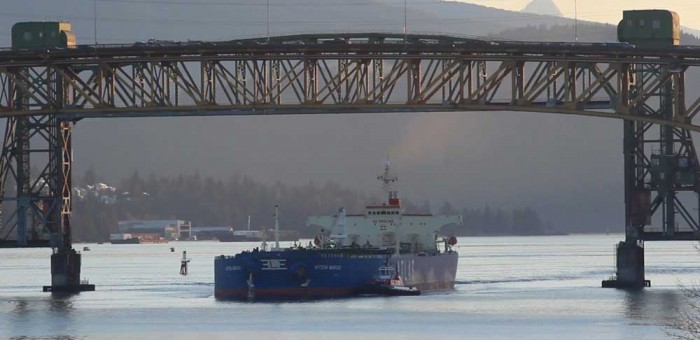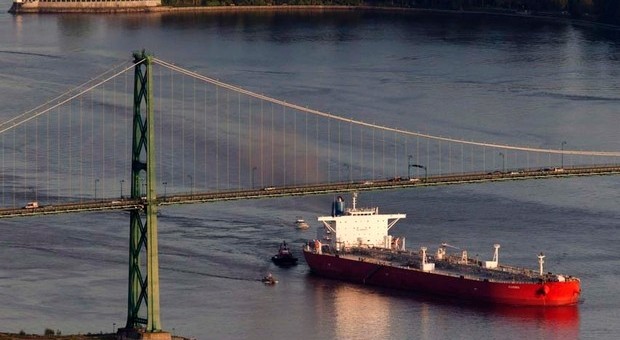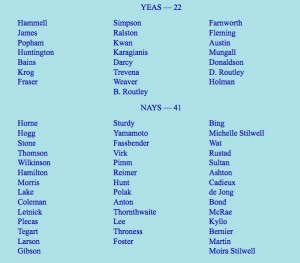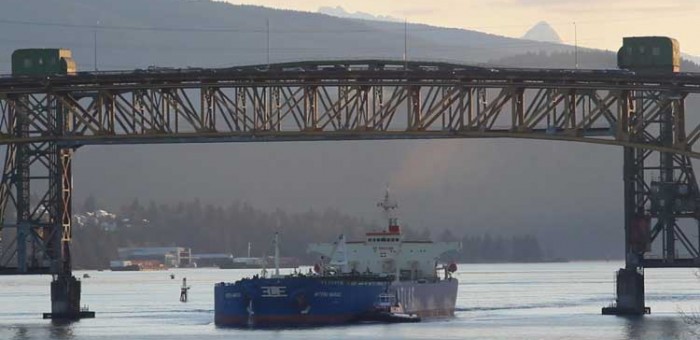Pipelines
Giving British Columbians a Voice on Heavy Oil Pipelines
Today in the Legislature I rose to table my second private members’ bill: Bill M220, Recall and Initiative Amendment Act, 2015.
It is clear that British Columbians are concerned about oil pipelines and have lost confidence in the federal review process. The problem is, the tools we have to make our voices heard are too restrictive. If enacted, this bill would give British Columbians a stronger voice on how oil pipeline proposals are evaluated in the province.
Just last month, people in Vancouver saw first hand how unprepared we are for an oil spill. It’s clear from the federal hearings on the Trans Mountain pipeline that these concerns aren’t being adequately addressed. My bill would make it easier for British Columbians to require their provincial government to hold a made-in-B.C. hearing process on oil pipelines.
Introductory Remarks on the Bill
A. Weaver: It gives me great pleasure to introduce this bill that is designed to empower British Columbians so that their voices can be more effectively heard on environmental reviews of major projects, like oil pipelines.
It’s fitting that I introduce this bill this week as we move to committee stage debates on Bill 20, the Election Amendment Act. Too often politicians let themselves believe that the only time they need to listen to voters is at elections, and I disagree.
If we are to re-engage British Columbians in our democracy, we need to actively seek their view on far more of what we debate in the Legislature. We also need to provide them with additional tools to hold their government to account. The Recall and Initiative Amendment Act is one such tool.
As every member of this House will surely agree, we live in the most beautiful part of the world, and British Columbians want to keep it that way. They want to ensure our pristine coastlines, our natural environment and our unique ecosystems are preserved.
Under the existing Recall and Initiative Act an individual can put forward a bill to be either debated in the Legislature or put up for a non-binding referendum. To be successful, the proponent must collect signatures from 10 percent of registered voters in each of 85 electoral districts within 90 days.
The Recall and Initiative Amendment Act would change the electoral district requirement for initiatives that specifically address pulling out of environmental assessment equivalency agreements with the federal government. Successful petitions in these instances would require signatures from 15 percent of registered voters in British Columbia regardless of electoral district, making it easier to meet the requirements.
British Columbians have lost faith in the federal review process, particularly as they pertain to oil pipeline proposals. The province has not listened to their voices, and this bill would offer British Columbians an opportunity to ensure that their voices are heard. If an initiative were to pass under the proposed changes in the Recall and Initiative Amendment Act, it would require government to pull out of an existing environmental assessment equivalency agreement for a particular project and hold its own made-in-B.C. review of, for example, a proposed heavy-oil pipeline.
Video of Introductory Remarks
NEB Denies My Motion for More Adequate Answers
For more than a year now, I have been trying to get Trans Mountain to answer my questions on their pipeline proposal. As an intervenor in the National Energy Board (NEB) hearings, getting answers to questions is an essential prerequisite to offering an informed argument on whether the pipeline should be built or not.
Sadly, today I learned that the NEB has fully denied my second and final opportunity to get answers to essential questions. What is even more troubling is that I’m not alone.
Collectively, intervenors challenged 1,291 of the roughly 5,700 questions posed to Trans Mountain during the second round of information requests. Of those 1,291 questions, the National Energy Board only ruled in intervenors’ favour 32 times. Put another way, the NEB ruled in Trans Mountain’s favour 97.6% of the time.
Personally, I submitted nearly 100 questions this round and challenged 24 of the answers I received.
To be clear, I was not challenging unsatisfactory answers, or answers I disagreed with. There were many cases where I disagreed with the response that was given, but still received an answer.
Instead, I was challenging answers that simply did not respond to my questions.
Here’s an example:
One of my biggest concerns is that, from the information I have seen, we currently have no capacity to recover sunken or submerged oil. That means that if an oil spill were to occur, and the oil were to sink, we would have no way to clean it up.
For me, this is the line in the sand. We should not be transporting heavy oils along our coast if we cannot clean them up when they sink.
I therefore asked Trans Mountain to provide a list of all equipment owned and operated by Western Canada Marine Response Corporation (WCMRC – the organization that is contracted to respond to oil spills along the B.C. coast) that can be used to recover sunken oil.
In response, Trans Mountain acknowledged that heavy oils can sink under certain circumstances, but failed to provide the requested list. I noted this when I challenged the response, and asked that Trans Mountain provide the requested list. Once again, they did not.
After a back-and-forth, the NEB then gave the following ruling:
Deny – Motion sought information that Trans Mountain is not responsible for, or which is the responsibility of another body (e.g., regulator, tanker operators).
Deny – Motion sought information that may touch upon the List of Issues, but would not contribute to the record in any substantive way and, therefore, would not be material to the Board’s assessment. In some instances, the request was unreasonable or overly broad in scope.
How the NEB can feel that a basic question about WCMRC’s capacity to respond to sunken oil “would not contribute to the record in any substantive way” is beyond me. In my mind, that is one of the most fundamental questions to the whole hearing process. Can we clean up a heavy oil spill? And if we don’t know what equipment WCMRC has, how can we know if we can clean up a spill?
But here’s the other problem:
The NEB has ruled that Trans Mountain isn’t responsible for providing information on behalf of WCMRC. Yet, WCMRC isn’t directly involved in the hearing process. So we have a situation where we cannot get the information on record from Trans Mountain, but we also cannot get the information on record from WCMRC within the formal hearing process.[1]
This brings me back to the essential question: How can the NEB truly evaluate Trans Mountain’s ability to respond to a spill when they seem to have created a situation that denies the Board, and intervenors, the ability to get the information we need?
[1] It should be noted that WCMRC did take the time to meet with my staff and were incredibly helpful. They spent several hours going through their oil spill response plan and answering our questions. However, since that meeting occurred outside the parameters of the hearing process, the information they provided is not necessarily on record within the formal hearings and therefore cannot be considered by the National Energy Board.
We’ve Got Lots to Learn from Vancouver’s Oil Spill
Since last weeks’ oil spill in English Bay, British Columbians living in the lower mainland and across the province have felt let down by their governments.
Despite big promises about ‘world class’ spill response, what we witnessed in English Bay proves beyond a doubt that the term ‘world class’ amounts to little more than a soundbite.
You could, however, forgive British Columbians for feeling let down for another reason. They have been watching as their politicians fall over themselves to point fingers and lay blame at their opponents’ feet.
Concerns about oil spills have been growing in B.C. ever since Enbridge’s Northern Gateway pipeline was first put forward. With Kinder Morgan’s proposed Trans Mountain pipeline routed to come straight to Vancouver harbor, those concerns have come even closer to home.
Many people are now seeing first hand how unprepared we are for a spill.
However, our lack of response capacity doesn’t come as a surprise to anyone who has been paying attention to the Kinder Morgan hearing process.
As I write this, we are in the midst of a seriously flawed National Energy Board hearing process on Kinder Morgan’s Trans Mountain pipeline. If approved, the number of oil tankers leaving Vancouver harbor would increase by 580%.
In contrast to the 2700 litres that spilled, each of these tankers would carry up to 110,000 tonnes of oil along our coastline. Unlike the bunker fuel that spilt in English Bay, which largely floats, the diluted bitumen that these tankers would carry can sink. If that happens, we currently have no way of cleaning it up.
To date, Kinder Morgan – through the hearing process – has refused to consider even the possibility of a spill larger than 15% of what a single tanker would carry. When they did simulate a spill, they applied unrealistic conditions assuming, for instance, that wave and wind conditions would be minimal and that there would be 20 hours of sunlight in August for clean-up crews. (For the record: You would have to go to Tuktayotuk on the Arctic coastline to find 20 hours of sunlight in August!).
Roughly one third of the nearly 600 questions I submitted were not adequately answered. And I’m not alone.
The Cities of Burnaby and Vancouver have been true leaders in the hearings. Together they have submitted thousands of questions to Trans Mountain and countless motions as they advocate for a better process. They too have struggled to get answers to even basic questions.
Sadly, that same leadership has been largely absent on the provincial scene.
In a process that affects all British Columbians, not a single B.C. NDP or B.C. Liberal MLA even applied to be an intervenor.
This hearing is the best opportunity MLAs have to evaluate our spill response capacity in the context of the proposed increase in oil tankers. It allows us to explore how prepared we are for a spill, and what steps are being planned to address the significant gaps.
My staff and I have poured hundreds of hours into this process, studying Trans Mountain’s application and submitting countless questions.
That is why the finger pointing is so frustrating. It is politicking with a disaster when you have played little role in actually addressing the concerns ahead of time.
The clear absence of provincial leadership in these hearings has allowed us to get to where we are today. Had more MLAs been more vocal, we may have a more rigorous hearing process.
Yet it’s not too late. I have been calling for the B.C. government to pull out of the NEB hearings and hold their own review process for some time now. The B.C. NDP and countless British Columbians have done the same. All that stands in the way is government leadership.
I hope that the spill in English Bay will spark more than just finger pointing. I hope it will serve as a wake-up call that British Columbians need to expect more from their MLAs.
They should expect us to do what’s necessary to prevent a spill from occurring in the first place – not to line up after the fact to assign blame.
Trying to Protect the BC coast from expansion of thermal coal & diluted bitumen exports
During the committee stage of Bill 12, The Federal Port Development Act on Thursday afternoon, I put forth a number of amendments in an attempt to protect the British Columbia coast from the expansion of thermal coal and heavy oil (diluted bitumen) exports. These were the amendments mentioned in my earlier post on Bill 12. All amendments were defeated. Below I provide a brief excerpt from Hansard.
First Amendment
A. Weaver: With respect to the minister, the reason I have troubles with this legislation is…. We are not debating the Canada Marine Act. I will come to that.
Under the Canada Marine Act, the federal government can sell federal land in a port to a port authority, which could be administered by the province of British Columbia. In selling the land to the port authority, the Species at Risk Act and the Canadian Environmental Assessment Act no longer have any jurisdiction because the land is no longer owned by the federal government. It is now within the port authority, administered by the province of British Columbia.
My concern, therefore, with respect to an undertaking is that heavy oil or thermal coal experts would then no longer have to worry about Species at Risk or Canadian Environmental Assessment Act implications in any development there. The problem with that is that we don’t have anything in the province of British Columbia as a Species at Risk Act.
In essence, what’s happening in accepting an agreement like this, through an undertaking involving either coal or heavy oil, as we will discuss in section 3, is we are essentially saying that we in British Columbia can exempt such development from the federal Species at Risk Act and we have nothing to fall upon here in British Columbia. We can fall on the Environmental Assessment Act.
Frankly, with respect to what we’ve seen with Kinder Morgan and Enbridge, the province has done an admirable job in terms of representing the interests of British Columbia. I have not seen that with respect to thermal coal, and for this reason I do have two amendments I would like to bring here to specifically exclude from ‘undertaking’.
[To amend as follows:
By adding the text shown as underlined:
Section 1
“undertaking” means an undertaking, or an undertaking in a class, designated for the purposes of section 64.1(2)(a) of the Canada Marine Act; excluding an undertaking, or an undertaking in a class, relating to the import or export of thermal coal.]
That is the first amendment I so move.
The Chair: The amendment was proposed by the member for Oak Bay–Gordon Head. It reads: “‘undertaking’ means an undertaking, or an undertaking in a class, designated for the purposes of section 64.1 (2)(a) of the Canada Marine Act, excluding an undertaking, or an undertaking in a class, relating to the import or export of thermal coal.”
Amendment negatived on the following division:
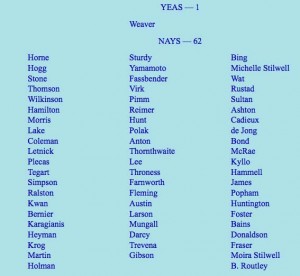
The Chair: Hon. Members, stay in your seats. The member is going to move another amendment.
Second Amendment
A. Weaver: As I mentioned earlier, I have a legal backgrounder from West Coast Environmental Law, which talks about the passage of Canada Marine Act, which we’re talking with respect to the “undertaking” definition here.
That would significantly increase the powers of port authorities, allow the federal government to off-load its responsibility over shipping in federal ports, etc. The changes now allow port authorities to buy federal land and infrastructure from the government and then lease those lands to companies or authorize companies to use them for as long as the port authority has control over them.
Once sold, those lands would no longer be federal property, meaning they would not be subject to terrestrial species protection under the Species at Risk Act.
Seeing as we have no species at risk act here in British Columbia, this raises some concern, which is why I move, again, an amendment to amend as follows:
[By adding the text shown as underlined:
Section 1
“undertaking” means an undertaking, or an undertaking in a class, designated for the purposes of section 64.1 (2)(a) of the Canada Marine Act excluding an undertaking or an undertaking in a class relating to the import or export of heavy oil.]
In light of the fact that we do not import heavy oil that probably is moot, but certainly export is a big issue that’s facing us now.
The Chair: Hon. Members, if the House waives the time we will proceed right away. Do we have consent?
Leave granted.
Amendment negatived on the following division: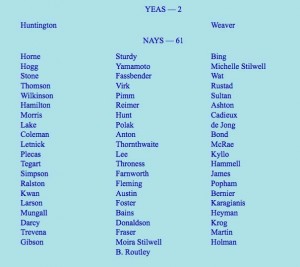
Third Amendment
A. Weaver: Thank you to the minister for the answer. My concern here is that the province would enter an agreement and potentially get into a position where the Species at Risk Act is not applicable or in force. I have an amendment here I’d like to move, which is to amend section 2 as follows:
[By adding the text shown as underlined:
Section 2
With the prior approval of the Lieutenant Governor in Council, a member of the Executive Council may enter into an agreement on behalf of the government.
If
(a) the province has first enacted provincial legislation comparable in power and scope to the Species at Risk Act (S.C. 2002, c. 29), and
(b) any and all port developments subject to the agreement that would have previously triggered a review under the Species at Risk Act (S.C. 2002, c. 29) prior to the royal assent of Bill C-43 (2014), automatically trigger a review under the legislation referenced in subsection (a).]
On the amendment.
A. Weaver: This is a piece of legislation trying to ensure that British Columbia enforces species-at-risk legislation. If it doesn’t enforce the federal one — which it can’t, of course — it has to produce its own if it’s going to enter an agreement as per the discussion here.
The Chair: Hon. Members, it’s an amendment moved by the member for Oak Bay–Gordon Head regarding the Species at Risk Act.
Amendment negatived on the following division:
Unanswered Questions Remain After final Responses from Trans Mountain
Yesterday I submitted a motion to the National Energy Board asking it to compel Trans Mountain to provide full and adequate responses to my second and final round of questions in the hearing process.
The complete 2015-02-26 – MLA Weaver Motion on Adequacy of IR 2 Answers submission raises a number of key issues. Three examples serve to illustrate the additional information we are seeking.
- Trans Mountain applied “risk reduction factors” in their risk analysis when certain conditions were met. For example, a risk reduction factor of 2 is applied to tethered escort tugs responding to prevent a powered grounding incident. We asked Trans Mountain to provide us with a formal validation of these numbers. These reduction factors play a critical role in the risk analysis and the chosen values need to be grounded in evidence. I do not believe that asserting them to be appropriate justifies them being appropriate.
- I asked a simple question. Please provide a list of any and all equipment owned and operated by Western Canada Marine Response Corporation (WCMRC) to recover sunken oil. In response, Trans Mountain asserted that diluted bitumen would not sink (despite the existence of evidence to the contrary). I was not provided with a list of equipment.
- We asked Trans Mountain about the worst case wind scenarios that were used in their human health risk assessment. They responded that they chose certain conditions that represent the greatest potential ecological damage. Since we’re talking about a human health impact assessment, Trans Mountain’s claim that they chose certain conditions that represent the greatest potential ecological damage is not answering whether the scenario for both Arachne Reef and Westridge terminal constitute worst case scenarios in terms of impact on human health.
The press release that we issued at the time is reproduced below.
Media Statement: February 27, 2015
MLA Weaver: Unanswered questions remain after final responses from Trans Mountain
For Immediate Release
Victoria B.C. – Andrew Weaver, MLA for Oak Bay-Gordon Head and Deputy Leader of the B.C. Green Party has submitted a motion to the National Energy Board (NEB), asking it to compel Trans Mountain to provide full and adequate responses to his second and final round of questions in the hearing process.
Dr. Weaver is challenging roughly a third of the nearly 100 questions he submitted. He put forth his motion on the basis that the answers were incomplete or did not respond to his question.
“While there’s no doubt that overall the answers I received this time around were more substantive than last time, it’s still disappointing that in a number of cases I failed to receive full and adequate responses to basic questions about the Trans Mountain proposal,” says Andrew Weaver. “I submitted this motion because my constituents are concerned about increased tanker traffic just offshore of our riding and they deserve answers.”
The second round of Information Requests marks the final opportunity intervenors will have to test the evidence submitted by Trans Mountain in its proposal. Dr. Weaver’s questions focus on human health risks associated with the project and follow-up on his previous questions relating to the risks, impacts and response capacity associated with a potential oil spill.
Intervenors have been increasingly critical of the hearing process, noting that the absence of oral cross-examination has seriously undermined their ability to receive answers to even the most basic questions about the pipeline proposal.
During the first round, Dr. Weaver challenged roughly a third of the answers he received to his nearly 500 questions. Intervenors collectively challenged more than 2000 answers with the NEB ruling in intervenors’ favour fewer than 5% of the time.
“I have concerns that this whole hearing process is being treated as a box-ticking exercise. In the first round of questions, I didn’t receive substantive answers to many of my questions and the NEB didn’t seem particularly interested in supporting us to ensure we received full and complete responses. I hope that this time it is different. “
In light of escalating issues with the process, Andrew Weaver continues to call on the B.C. Government to pull out of the Environmental Assessment Equivalency Agreement that it signed with the Federal Government and hold its own, independent hearing process.
-30-
Media Contact
Mat Wright – Press Secretary, Andrew Weaver MLA
mat.wright@leg.bc.ca
1 250 216 3382

